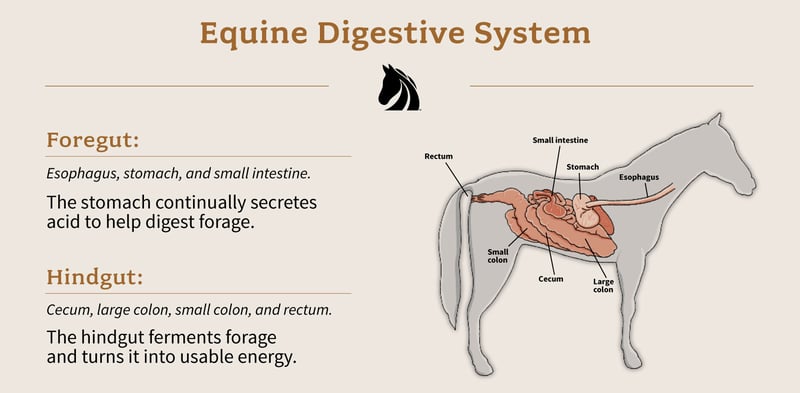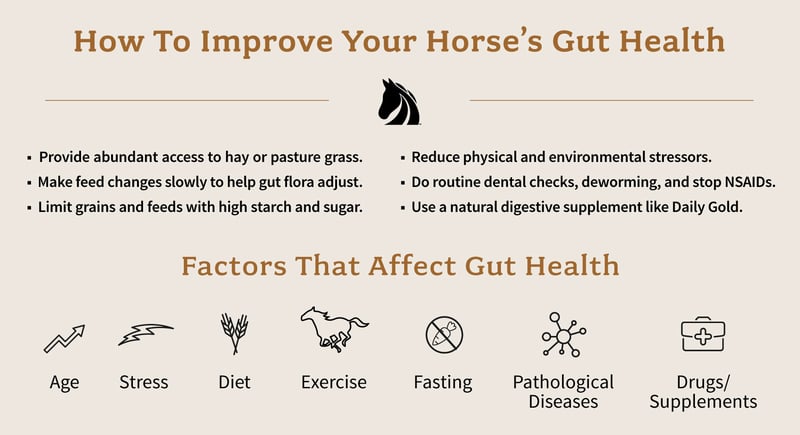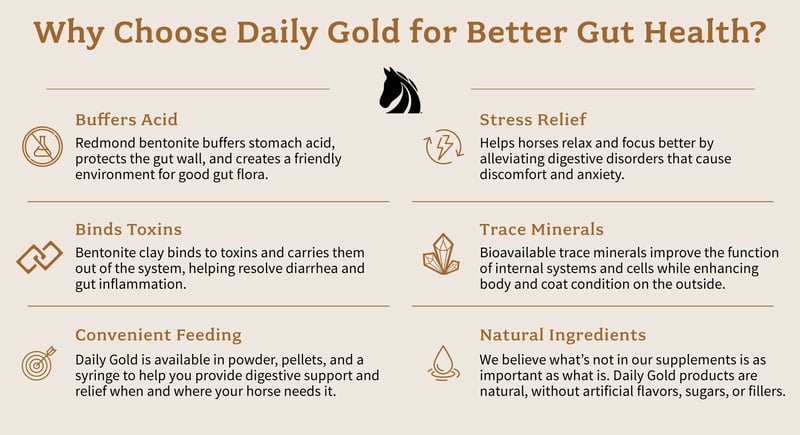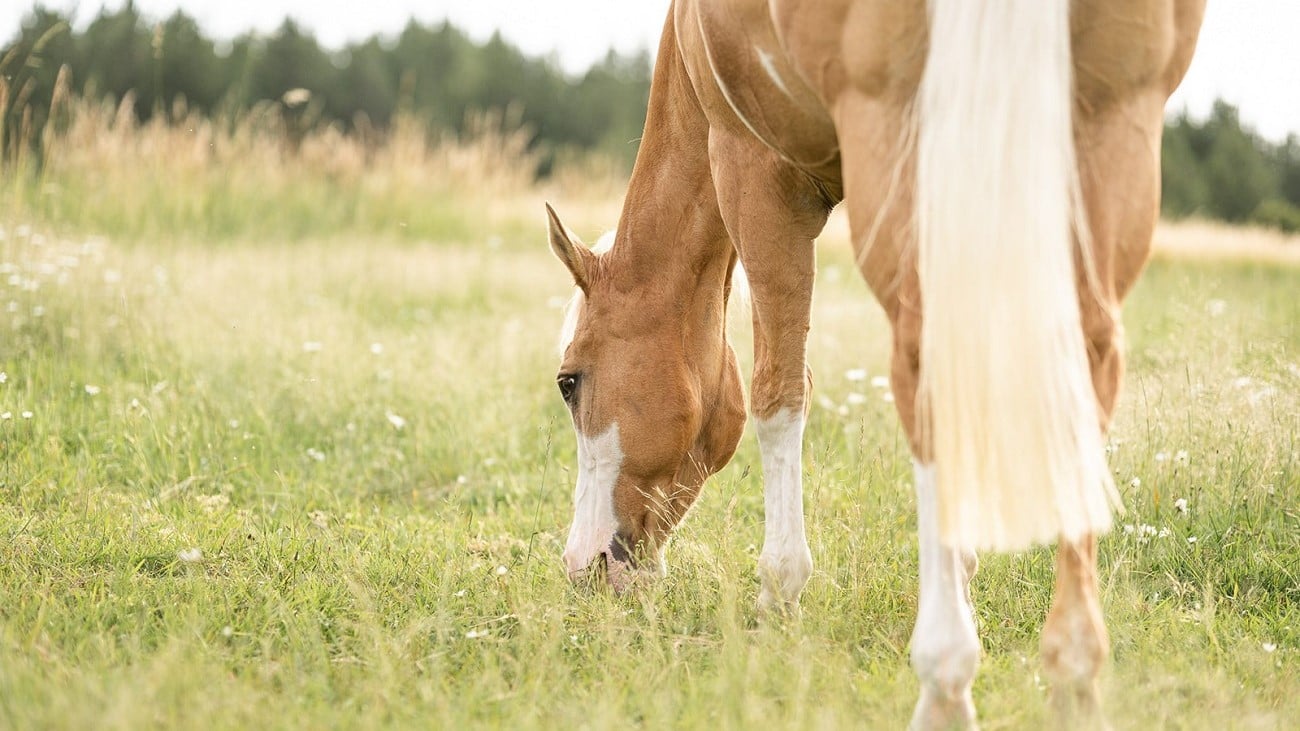How to Naturally Improve Your Horse's Gut Health
April 14, 2023
How To Naturally Improve Your Horse's Gut Health
Have you checked in on your horse's gut health lately? We often hear about the importance of supporting a horse's gastric system. But good gut health is more than a trendy buzzword—it's a gauge for overall well-being. And it's a rather delicate yet critical system to keep in line.
So how do you keep your horse’s digestive system strong and active? In this blog, we'll cover how the equine gut works, what can happen when it's not functioning optimally, and most importantly, how you can support your horse's digestive system to keep it healthy and happy.
Quick Content Guide
- Roles of the foregut, hindgut, and gut microbiome
- 9 factors that affect equine digestion
- Causes and signs of ulcers in horses
- How to recognize hindgut problems
- 8 ways to improve horse gut health
- How Jamie resolved her horse's digestive issues
Facts About the Horse Digestive System
It’s helpful to understand the mechanics of our equine friend’s digestion, so let’s review some biology for a moment. First, what type of digestive system does a horse have? Horses are non-ruminants, so two important structures of their digestive systems are the foregut and the hindgut. You’ve probably heard of both, but do you know their respective roles? Let’s talk briefly about each, as depicted in the horse digestive system diagram below.

The Foregut
A horse’s foregut includes the stomach and small intestine. Unlike cattle, horses do not have multiple stomachs. And because the average horse stomach is relatively small—having a capacity of about 2.5 gallons—food passes through it quickly. That’s why horses can graze almost nonstop. In fact, they'll spend about 16 hours a day grazing if allowed.
Foraging is their MO, what they’re wired to do. And since a horse is made to munch, it handles the almost constant flow of incoming forage by continually secreting acid to help digest it. Even if forage is not available, the stomach will still produce acid. And with nothing to buffer it, the protective stomach lining may break down, potentially leading to ulcers and inflammation.
The Hindgut
A hindgut in horses includes the cecum, large colon, and small colon. It's basically a large-capacity fermentation vat that holds about 25 to 30 gallons. With the help of trillions of friendly bacteria, the hindgut breaks down and ferments all that fibrous forage horses nibble on and converts it into volatile fatty acids used for energy.
The hindgut also allows horses to absorb and utilize all the minerals, vitamins, and amino acids needed for survival and optimal health. Pretty important work, right? Now we’re getting an idea of how crucial the hindgut is to proper horse nutrition and how dire a problem if it’s not fermenting and digesting food properly with the help of healthy bacterium. Let’s talk about those all-important gut bugs a bit more.
The Role of Equine Gut Microbiome
Did you know a horse’s intestinal tract is home to a diverse and dense neighborhood of trillions of microorganisms? It includes fungi, parasites, protozoa, archaea, viruses, and bacteria (National Library of Medicine). This community of coexisting microorganisms interacting in a specific space—like the equine hindgut—is known as the microbiota.
Just like humans, each horse has a unique population of gut microbiota. It’s like a one-of-a-kind fingerprint (or should we say hoofprint) and has a direct impact on equine health. When helpful colonies of bugs are balanced and working together in harmony to ferment feed and make life-giving nutrients available, they have an incredible influence for good on a horse’s:
- Nutrient absorption
- Metabolism
- Disease protection
- Immune system
- Weight
- pH level
- Gut lining
When the microbiota becomes unbalanced, it loses diversity. And without a diverse population, even some beneficial bacteria can dominate and become pathogenic. Clearly, maintaining a healthy gut microbiota is vital for your horse's health and well-being. So let's explore some factors that can negatively impact it.
Factors that Affect the Digestive System of a Horse
We know the digestive system of the horse is an amazing nutrient factory and health barometer—and it’s also extremely sensitive. Many things can affect microbial balance. In horses, most digestive disturbances result from these factors outlined in this Journal of Equine Veterinary Science article:
- Diet (especially a rapid change or high-starch grains)
- Exercise (too much can harm the microbiome)
- Fasting (limiting feed or grazing leads to excess acid)
- Supplements
- Pharmaceuticals and antibiotics
- Pathological conditions (colitis, diarrhea, colic, laminitis, equine ulcers)
- Age
- Stress (trailering, competition, training, social relationships)
- Domestication (captive horses have less diverse gut microbiome than free-living horses
- Mycotoxins in feed
Disorders stemming from the instigators above can arise in both the equine foregut and hindgut, with both areas exhibiting similar symptoms throughout a horse’s body. It's important to be aware of the following gut problems in horses and how they can impact health.
Gastric Ulcers in Horses
It’s the dreaded six-letter word every horse lover hates to hear. Equine ulcers are a pernicious problem, affecting a significant number of horses and even foals. Stomach (foregut) ulcers occur when acid builds up and erodes the stomach lining. Colonic or hindgut ulcers are caused by factors that disturb the gut microbiome. Ulcers are often painfully difficult and expensive to treat with pharmaceuticals.
These instigators may cause ulcers in horses (AAEP):
- Stall confinement/limiting feed to twice a day
- High-grain diet
- Stress
- Hauling
- NSAIDs
- Strenuous exercise
- Training and competing
- Mixing groups of horses/limited social contact with other horses
Look for these common signs of equine ulcers (UC Davis):
- Girthiness
- Grinding teeth
- Poor appetite/weight loss
- Attitude changes
- Decreased performance
- Reluctance to train
- Poor body condition/hair coat
- Low-grade colic
Hindgut Problems in Horses
The health of the hindgut depends on the delicate and proper balance between beneficial and harmful bacteria. Here are ways your horse's health may be affected if the gut microbiome is negatively altered and the hindgut is unable to ferment and absorb nutrients properly:
- Poor appetite
- Poor feed utilization
- Colic/gas colic
- Dehydration
- Poor hair coat/hoof quality
- Reduced immune function
- Attitude changes
- Laminitis
- Hindgut stasis, inflammation, and ulceration
- Vitamin and mineral deficiencies
- Decreased performance
- Reactive when saddling
8 Ways to Improve Gut Health for Horses
Now that we better understand the equine gut and what factors hinder its performance, let's shift our focus to the solutions! Here are eight recommendations to ensure your horse's stomach and hindgut stay in optimal fermenting and fighting form.

1. Frequent Feedings & High-Quality Forage
Offering plenty of free-choice access to hay or pasture grass is the first place to start improving digestion. A slow and steady supply of high-quality forage neutralizes the continual production of acid in a horse’s stomach and satisfies its natural need to graze.
If your horse is stabled and frequent turnout time isn’t feasible, a slow-feeder container or hay net are good alternatives. These tools simulate grazing and keep feed in front of horses throughout the day without overloading. Daily Gold Stress Relief is another natural solution to buffer excess acid and balance stomach pH. Learn more below!
2. Make Feed Changes Gradually
Making a sudden feed change can throw the hindgut microbiome into chaos. The horse digestive tract needs time to transition! Equine nutritionist Dr. Juliet Getty recommends this approach to introducing new feed:
“If you have to change hay every few weeks… do a little advanced planning and set aside a few bales of old hay while slowly switching over to the new hay. You may find yourself regularly blending old and new hays since it is best to take approximately one week to make the adjustment.
"If you’re adding a commercially fortified feed to your horse’s diet to meet additional energy demands, make sure he already has some hay in his belly before feeding a concentrated meal. If you need to introduce a new product, take two to three weeks to safely change to a new feed.”
3. Limit Grain Consumption
Though high-quality forage should be the foundation of a horse’s diet, concentrates like oats, corn, and pelleted grains are still commonly fed. Grains are naturally high in starch, and feeding too much can lead to lactic acid accumulation, hindgut acidosis, and diseases such as colic, metabolic acidosis, and laminitis (Iowa State University).
Free-choice grass hay with an appropriate vitamin and mineral supplement is sufficient for most horses with lower caloric needs. If additional calories are needed, grains can be fed in small amounts. Additionally, look for commercial feeds with highly digestible fiber and fat rather than starches and sugars.
4. Decrease Environmental Stress
Horses are emotional creatures and sensitive to their surrounding environment. Limiting stress will promote better gut health in horses and keep them happier. Here are six ways to do it:
- Address your horse’s workload. Is she exercising too much or struggling under the pressures of competition or showing? Consider lightening the load.
- Stick to a regular feeding, training, and exercise schedule. Horses are creatures of habit that thrive on consistency.
- Allow your horse to socialize with other friendly pasture pals or provide a visible connection to others if stalled.
- Provide ample grazing or constant access to forage to reduce digestive and emotional stress.
- Maximize turnout or paddock time with appropriate exercise to boost endorphins and keep things moving in the gut.
- Introduce healthy toys, like a mineral Rock on a Rope or ball, to the stall or paddock as a stress and boredom buster.
5. Routine Dental Care
A problematic tooth or dental abnormality can cause improper chewing that leads to longer forage length in a horse's gut, and that may create difficulty digesting food. Get regular dental check-ups by a qualified equine professional. Early treatment will help prevent further complications in the gut.
6. Deworm Regularly
Parasites are a risk to even the most well-cared-for horses. An infestation can cause dangerous infections that disrupt gut function and cause diarrhea, weight loss, colic, or other health issues. Talk to your vet about a specific deworming plan for your horse, and stick with it.
7. Discontinue Drugs
NSAIDs (non-steroidal anti-inflammatory drugs), such as Bute and Banamine, are commonly used in horses to treat inflammation and pain. However, they can also wreak havoc on a horse’s gut, causing harmful side effects like diarrhea, loss of appetite, and a dull attitude. If you want to help keep your horse’s digestion normal, nix the NSAIDs and consider alternative pain management options.
8. Use a Horse Digestive Supplement
A horse dealing with disrupted digestion needs gentle gastric support. Daily Gold Stress Relief by Redmond is a natural bentonite clay digestive supplement and equine gut balancer. It buffers stomach acid and binds harmful toxins, creating a friendly environment for healthy bacteria to thrive.
Daily Gold promotes normal gut function and offers valuable health benefits, including:
- Buffers acid and soothes painful ulcers
- Protects and strengthens the gut wall
- Improves nutrient absorption
- Binds harmful mycotoxins and parasites
- Resolves loose stool and diarrhea
- Reduces stress by relieving digestive issues
Daily Gold is available in three forms: powder, pellets, and a syringe. The powder or pellets can be added to feed for daily gut protection, while the Stress Relief Syringe is recommended before stressful situations or during digestive episodes like diarrhea and acute ulcer pain. Keep reading to find out how Jamie got her barrel horse Pistol's digestion back on track using Redmond Daily Gold.

Meet Jamie and Her Barrel Horse Pistol
My 16-year-old gelding and barrel horse Pistol and I are a team. The dynamic between us is something I’ve never experienced before—and I've been competing with horses my entire life. Pistol trusts me and I trust him, and that’s how this horse has become who he is today.
Before Pistol and I became partners he was known as an outlaw with a dangerous reputation. But I couldn’t ignore something in my soul during our first ride that told me this was my horse. That day I made a promise to Pistol to never quit him. Today, he’s become known and loved as the little horse with a big heart—all because I showed some kindness and put a little faith in him.
Recently, I became concerned when Pistol started having problems again. He was struggling with digestive upset, anxiety and diarrhea on the road, weight loss, and overall lacked his usual fire when running. All of his old problems were back—even while on a high dose of a product that was supposed to help. It was tough knowing something wasn't right. But even though Pistol wasn't running or behaving up to his full potential, I wasn’t going to give up on him.
I had heard about Redmond Equine and decided to try Pistol on a trial of Daily Gold during a five-week buckle series barrel race. The first week I noticed a difference, and the results just got better and better. My horse became faster and more focused with each run. His anxiety dropped, the nervous diarrhea was gone, and he seemed happier and was gaining weight.
Pistol clocked multiple 1D times during that race and finished fourth overall! The difference was clear: Redmond products worked, and they worked fast. I am grateful for Daily Gold—it's truly a game changer—and I am beyond blessed and proud of my horse. Pistol has gone from a 3D/4D horse to a consistent 1D horse, finishing next to other pro-level horses. He feels good and knows it's finally his time to shine. And I feel good getting back to riding, competing and winning.
—Jamie Hagen
Summary
Ultimately, good gut health in horses is critical to overall well-being, longevity, and quality of life. By watching for signs of digestive issues and implementing the tips above, you can take control of your horse's gut health for the better! Your horse will thank you, and your relationship will improve. Ready to get started? Like Jamie, Daily Gold is a great place to begin getting your equine's digestion back on track. Click below to try it today and see the difference it can make in your horse.
Learn More
- Discover why some horses eat dirt to settle digestive disturbances and other problems.
- Learn common causes of diarrhea in horses and scours in foals, and how Daily Gold can help.
© Redmond Equine 2023. All rights reserved.
Related posts

How to Treat and Prevent Gas Colic in Horses
Gas colic in horses is common but shouldn't be overlooked. Dr. Juliet Getty, with Getty Equine Nutrition, gives advice on how to prevent horse gas...
December 18, 2024

Redmond Daily Duo: Foundational Horse Mineral Supplements
Choosing the right minerals for your horse is vital. Redmond keeps it simple with two core mineral supplements that support horse gut health and...



